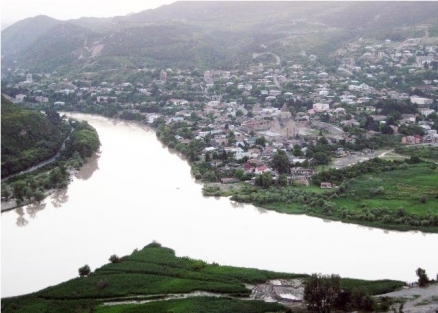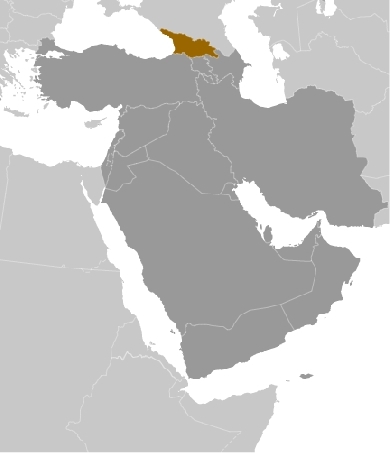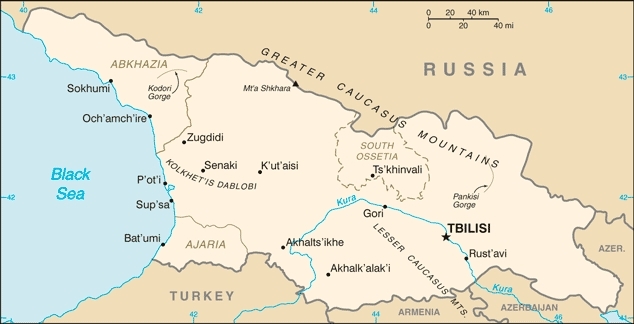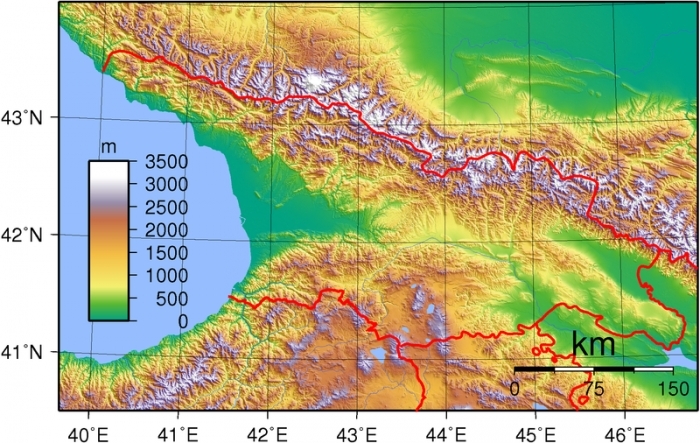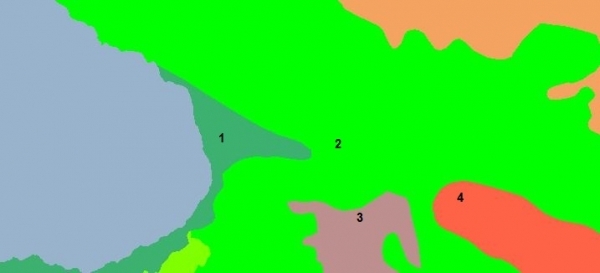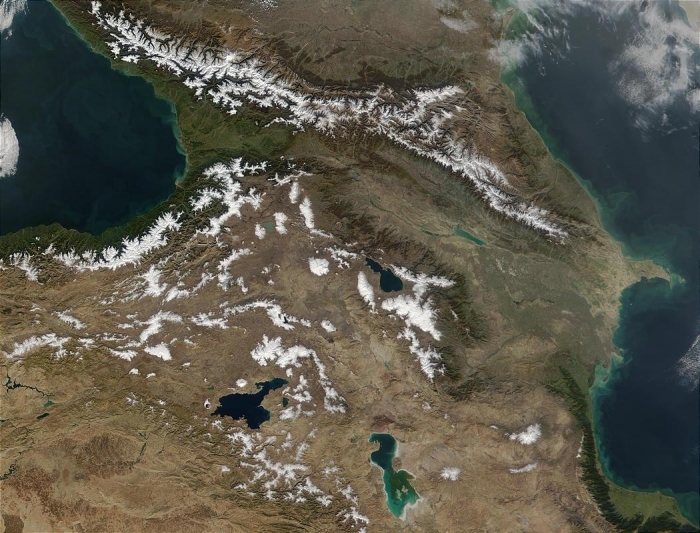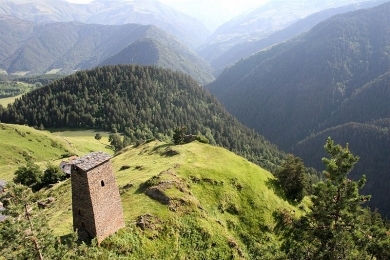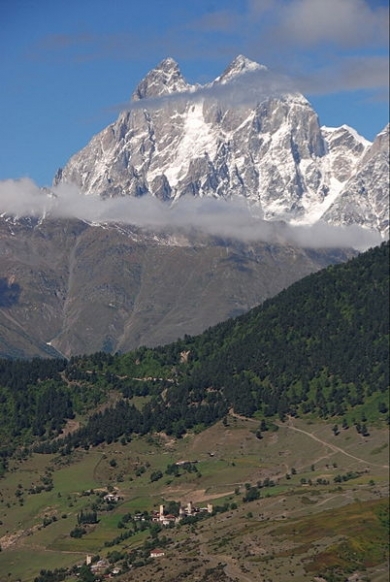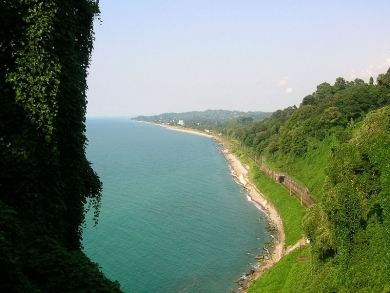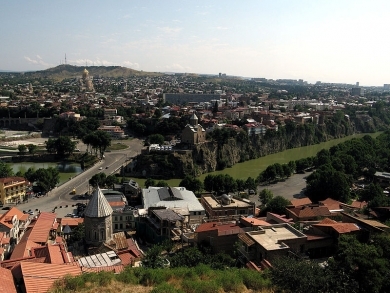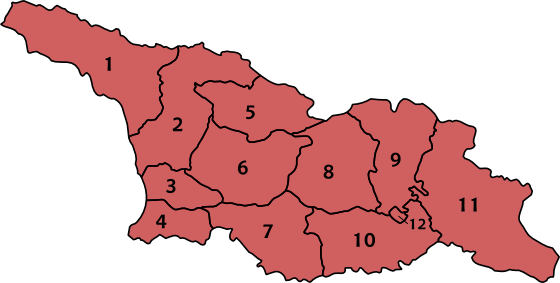Georgia
Contents
Georgia (Country)
Georgia is a nation of just over four-and-a-half million people in southwestern Asia, bordering the Black Sea, between Turkey and Russia, with a sliver of land north of the Caucasus extending into Europe.
Its major environmental issues include:
- air pollution, particularly in Rust'avi;
- heavy pollution of Mtkvari River and the Black Sea;
- inadequate supplies of potable water;
- soil pollution from toxic chemicals{| style="width: 400px" cellspacing="10" cellpadding="10" align="right"
Georgia is susceptible to earthquakes.
The region of present day Georgia contained the ancient kingdoms of Colchis and Kartli-Iberia. The area came under Roman influence in the first centuries A.D. and Christianity became the state religion in the 330s. Domination by Persians, Arabs, and Turks was followed by a Georgian golden age (11th-13th centuries) that was cut short by the Mongol invasion of 1236. Subsequently, the Ottoman and Persian empires competed for influence in the region.
Georgia was absorbed into the Russian Empire in the 19th century. Independent for three years (1918-1921) following the Russian revolution, it was forcibly incorporated into the USSR until the Soviet Union dissolved in 1991.
Mounting public discontent over rampant corruption and ineffective government services, followed by an attempt by the incumbent Georgian government to manipulate national legislative elections in November 2003 touched off widespread protests that led to the resignation of Eduard Shevardnadze, president since 1995. In the aftermath of that popular movement, which became known as the "Rose Revolution," new elections in early 2004 swept Mikheil Saakashvili into power along with his United National Movement party.
Progress on market reforms and democratization has been made in the years since independence, but this progress has been complicated by Russian assistance and support to the separatist regions of Abkhazia and South Ossetia. Periodic flare-ups in tension and violence culminated in a five-day conflict in August 2008 between Russia and Georgia, including the invasion of large portions of undisputed Georgian territory. Russian troops pledged to pull back from most occupied Georgian territory, but in late August 2008 Russia unilaterally recognized the independence of Abkhazia and South Ossetia and Russian military forces remain in those regions.
Georgia is strategically located east of the Black Sea; Georgia controls much of the Caucasus Mountains and the routes through them. Georgia's location between the Black Sea, Russia, Armenia, Azerbaijan, and Turkey gives it strategic importance as a transit corridor. It is developing as the gateway from the Black Sea to the Caucasus and the Caspian basin. Following Russian bans on imports of Georgian wine, mineral water, and agricultural products, and the severing of transportation links in 2006, Georgia has reached out to other neighbors and to the West to diversify its export markets.
Geography
Location: Southwestern Asia, bordering the Black Sea, between Turkey and Russia, with a sliver of land north of the Caucasus extending into Europe
Geographic Coordinates: 42 00 N, 43 30 E
Area: 69,700 sq km
Land Boundaries: 1,461 km (Armenia 164 km, Azerbaijan 322 km, Russia 723 km, Turkey 252 km)
Coastline: 310 km
Maritime Claims:
Natural Hazards: earthquakes
Terrain: largely mountainous with Great Caucasus Mountains in the north and Lesser Caucasus Mountains in the south; Kolkhet'is Dablobi (Kolkhida Lowland) opens to the Black Sea in the west; Mtkvari River Basin in the east; good soils in river valley flood plains, foothills of Kolkhida Lowland. The highest point is Mt'a Shkhara (5,201 m) and the lowest point, the Black Sea (0 m).
Climate: warm and pleasant; Mediterranean-like on Black Sea coast
Topology of Georgia. Source: Wikipedia.
Ecology and Biodiversity
Ecoregions of Georgia. Source: World Wildlife Fund
- Euxine-Colchic deciduous forests
- Caucasus mixed forests
- Eastern Anatolian montane steppe
- Azerbaijan shrub desert and steppe
See also:
- Sapelo Island National Estuarine Research Reserve, Georgia
- Biological diversity in the Caucasus
- Biological diversity in the Irano-Anatolian
- Black Sea large marine ecosystem
Often regarded as the southeastern border of Europe, the Caucasus Mts stretch from the Black Sea (left) to the Caspian Sea (right). The mountain range spans 1,125 km (700 mi), forming part of the southern Russian border, and crossing Georgia, Armenia, and Azerbaijan from left to right respectively. With a snowline of approximately 3,350 m (11,000 ft) and many peaks over 4,500 m (14,760 ft), much of the snow seen in this image is present year round. Also visible in this photo are apparent phytoplankton blooms in the Caspian Sea, marked by blue-green swirls. Image credit: NASA.
People and Society
Population: 4,585,874 (July 2011 est.)
Ethnic groups: Georgian 83.8%, Azeri 6.5%, Armenian 5.7%, Russian 1.5%, other 2.5% (2002 census)
| Tusheti region. Source: Wikimedia Commons |
| Ushba, a peak in the Svaneti region. Source: Ilan Molco/ Wikimedia commons |
| Black Sea coast at Batumi in theAdjara Autonomous region. Source: Wikimedia Commons. |
| Tblisi panorama. Source: Oleg Kurtsev/Wikimedia Commons |
Age Structure:
0-14 years: 15.6% (male 383,856/female 333,617)
15-64 years: 68.3% (male 1,511,844/female 1,620,727)
65 years and over: 16% (male 293,143/female 442,687) (2011 est.)
Population Growth Rate: -0.327% (2012 est.)
Birthrate: 10.75 births/1,000 population (2012 est.)
Death Rate: 10.05 deaths/1,000 population (July 2012 est.)
Net Migration Rate: -3.96 migrant(s)/1,000 population (2012 est.)
Life Expectancy at Birth: 77.32 years
male: 73.99 years
female: 81 years (2012 est.)
Total Fertility Rate: 1.46 children born/woman (2012 est.)
Languages: Georgian (official) 71%, Russian 9%, Armenian 7%, Azeri 6%, other 7% Note: Abkhaz is the official language in Abkhazia.
Literacy: (age 15 and over can read and write): 100% (2004 est.)
Urbanization: 53% of total population (2010) growing at an annual rate of change of -0.4% (2010-15 est.)
History
Georgia's recorded history dates back more than 2,500 years. Georgian, a South Caucasian (or "Kartvelian") language, unrelated to any outside the immediate region, is one of the oldest living languages in the world and has its own distinct alphabet. Located in the picturesque Mtkvari River valley, Georgia’s capital, Tbilisi, is more than 1,550 years old. In the early 4th century, Georgia became the second nation in the world to officially adopt Christianity. Georgia has historically been situated on the margins of great empires, and Georgians have lived together in a unified state for only a fraction of their existence as a people. Since at least the 1st century B.C. through the 18th century, much of Georgia's territory was fought over by Persian, Roman, Byzantine, Arab, Mongol, and Turkish armies. The zenith of Georgia's power as an independent kingdom came in the 11th and 12th centuries, during the reigns of King David the Builder and Queen Tamar, who rank among the most celebrated of all Georgian rulers.
In 1783, the king of Kartli (in eastern Georgia) signed the Treaty of Georgievsk with the Russians, by which Russia agreed to take the kingdom as its protectorate. In 1801, the Russian empire began the piecemeal process of unifying and annexing Georgian territory, and for most of the next 2 centuries (1801-1991) Georgia was ruled from St. Petersburg or Moscow. Exposed to modern European ideas of nationalism under Russian tutelage, Georgians, like the influential writer Ilya Chavchavadze, began calling for greater Georgian independence.
The independent Republic of Georgia was established on May 26, 1918, in the wake of the Russian Revolution. Pro-Menshevik president Noe Zhordania and a social-democratic government led the country until March 1921, when it was occupied by the Bolshevik Red Army. Georgia became a Soviet Socialist Republic the following year. Several of the Soviet Union's most well-known leaders in the 1920s and 1930s were Georgian, such as Joseph Stalin, Sergo Orjonikidze, and Lavrenti Beria, the head of Stalin’s secret police. During the Soviet period, Georgia was one of the wealthiest and most privileged republics, and its Black Sea coastline was a popular holiday destination for the Soviet elite. On April 9, 1991, shortly before the collapse of the Soviet Union, the Supreme Council of the Republic of Georgia declared independence from the U.S.S.R.
Like other former Soviet Republics, Georgia’s newly declared independence was followed by ethnic and civil strife. Secessionists took control of parts of South Ossetia and most of Abkhazia prior to cease-fire agreements brokered in 1992 and 1994, respectively. Georgia began to stabilize in 1995. However, the separatist conflicts in Georgia's regions of Abkhazia and South Ossetia remain unresolved. Periodic flare-ups in tension and violence culminated in a 5-day war in August 2008 between Georgia and Russia. French President Nicolas Sarkozy negotiated a cease-fire between Presidents Mikheil Saakashvili and Dmitriy Medvedev on August 12, 2008, which remains in effect, although Russia has not fulfilled some of its cease-fire commitments, including withdrawal of its forces to pre-war positions. As part of the Saakashvili-Medvedev cease-fire agreement, the European Union established the EU Monitoring Mission (EUMM), which patrols the undisputed Georgian side of the administrative boundary lines with Abkhazia and South Ossetia but does not have access into those regions of Georgia. The cease-fire also called for international peace talks on the situation, which have taken place regularly in Geneva since October 2008 among the EU, United Nations (UN), Organization for Security and Cooperation in Europe (OSCE), Georgia, Russia, and the United States, with the participation of de facto representatives from Abkhazia and South Ossetia.
In August 2008, Russia recognized the independence of both Abkhazia and South Ossetia. With a handful of exceptions, all other countries, including the United States, have confirmed their continuing support for Georgia’s political sovereignty and territorial integrity within its internationally recognized borders.
February and April 2010 agreements between Moscow and the de facto Abkhaz and de facto South Ossetian authorities, respectively, established Russian military bases in the separatist regions for 49 years and are inconsistent with the terms of the August 12, 2008 cease-fire agreement. The cease-fire agreement calls for the parties to: refrain from resorting to the use of force, ensure a definitive halt to hostilities, provide free humanitarian access to the separatist regions, withdraw forces to their pre-conflict positions, and open international discussions on security and stability in Abkhazia and South Ossetia. In accordance with this agreement the EU, UN, and OSCE co-host ongoing Geneva-based talks on security and stability arrangements in the Abkhazia and South Ossetia regions. The governments of Georgia, Russia, and the United States send representatives to participate in the talks, and de facto authorities from Abkhazia and South Ossetia also participate, as do representatives of the Abkhaz and South Ossetian governments-in-exile.
Membership in NATO remains a priority for Georgia. In support of this objective, Georgia's military continues to undergo a process of reform. In September 2006, NATO granted Georgia “Intensified Dialogue” on requirements for membership in the organization. In September 2008, NATO and Georgia established the NATO-Georgia Commission (NGC) to enhance NATO’s relations with Georgia, coordinate NATO post-conflict assistance efforts, and underpin Georgia’s efforts in political, economic, and defense-related reforms. In December 2008, NATO foreign ministers agreed that Georgia should develop an annual national program under the auspices of the NGC. At the June 2010 NATO Defense Ministerial and at the November 2010 North Atlantic Council meeting in Lisbon, NATO countries reaffirmed the Alliance’s continued support for Georgia’s sovereignty and territorial integrity and its aspirations for NATO membership as agreed at the April 2008 NATO Summit in Bucharest.
Government
Georgia is a republic in which the president is elected for a term of 5 years, limited to two terms. The constitutional successor is the speaker of Parliament.
Parliamentary elections on November 2, 2003 were marred by irregularities and fraud according to local and international observers. Popular demonstrations ensued in the streets of Tbilisi. Protestors carried roses in their hands in events that became known as the Rose Revolution. President Eduard Shevardnadze resigned on November 23, 2003, and Speaker of Parliament Nino Burjanadze assumed the role of Interim President. Mikheil Saakashvili was elected to a 5-year term as president in January 2004. Parliamentary elections were re-held in March 2004 and President Saakashvili's party, National Movement, combined with Speaker Burjanadze's party, the Burjanadze-Democrats, won the majority of seats.
In 2004, the Government of Georgia initiated a variety of important reforms. The reform process is ongoing, and will require further implementation to achieve stated objectives. Specifically, the government has taken action against endemic corruption, receiving high marks from the World Bank. These initiatives have included reform of the notorious traffic police and implementation of a fair examination system for entering the university system.
On May 24, 2005, the Parliament passed legislation to decentralize power from the central government in Tbilisi to local government authorities in the regions, although much remains to be done before meaningful decentralization is fully achieved. Elections were held on October 5, 2006 for 1,732 members of 69 local councils and seven city governments.
An early presidential election was scheduled after President Saakashvili resigned in November 2007, following the government’s violent dispersal of protestors in front of Parliament. Parliamentary Speaker Nino Burjanadze assumed the presidency on an interim basis until January elections.
On January 5, 2008, Saakashvili was elected to a second 5-year term with 53.45% of the vote. Levan Gachechiladze, the unified candidate of nine opposition parties, earned 25.68%. Voters also overwhelmingly voted in two plebiscites in favor of NATO integration and spring parliamentary elections.
In the May 21, 2008 parliamentary elections, President Saakashvili’s United National Movement won an overwhelming majority with 119 out of 150 seats. International observers agreed that the government made efforts to conduct the elections in line with international standards but that the elections were uneven and incomplete in their adherence to those standards. Half of the opposition boycotted the new Parliament, citing voter intimidation, lack of balance by most media, and a lack of fair adjudication of complaints, problems also noted by the OSCE. As a result, by-elections were held in Tbilisi and Adjara on November 3, 2008. In the fall of 2009, Parliament passed legislation allowing those individuals who had refused to take their seats following the May 2008 elections to assume office if they so chose.
In December 2009, Parliament passed a new electoral code, providing for the direct election of Tbilisi’s mayor for the first time and the expansion of Tbilisi’s city council, among other reforms. Municipal elections held on May 30, 2010 were evaluated by international monitors from the OSCE as marking evident progress toward meeting OSCE and Council of Europe standards for democratic elections, but with significant shortcomings remaining, including a flawed election code, the misuse of administrative resources, and lack of balanced media coverage for opposition candidates. The United National Movement won the majority of seats in each of the country’s municipal councils, including in Tbilisi, and its candidate was elected mayor of the capital.
On October 15, 2010, the Parliament approved a number of amendments to the constitution, including provisions that shift political powers from the president to the prime minister following the 2013 presidential election. The Council of Europe’s Venice Commission considered the October 15 constitutional amendments to contain “several important improvements” but criticized the no-confidence procedures as a potential source of instability due to the time frame involved in the process and a potentially cumbersome process. Civil society activists, opposition leaders, the Venice Commission, and others had urged the Parliament to extend the period of debate which would have allowed “greater public buy-in and credibility.”
In preparation for 2012 parliamentary elections, Parliament adopted a new electoral code on December 27, 2011 that incorporated many recommendations from non-governmental organizations (NGOs) and the Venice Commission. However, the new code failed to address the Venice Commission’s primary recommendation to strengthen the equality of the vote by reconstituting single-mandate election districts to be comparable in size. On December 28, Parliament amended the Law on Political Unions to regulate campaign and political party financing. Local and international observers raised concerns about several amendments, including the vagueness of the criteria for determining political bribery and which individuals and organizations would be subject to the law. As of March 2012, Parliament was discussing further amendments to address these concerns.
Parliamentary elections are scheduled for 2012, and a presidential election is scheduled for 2013. Under Georgia’s constitution, President Saakashvili is prevented from running for a third term in 2013.
Government Type: Republic
Capital: Tblisis (population; 1.115 million est. 2009)
Other Major Cities:
Administrative divisions: 9 regions (mkharebi, singular - mkhare), 1 city (k'alak'i), and 2 autonomous republics (avtomnoy respubliki, singular - avtom respublika)
Independence Date: 9 April 1991 (from the Soviet Union); notable earlier date: A.D. 1008 (Georgia unified under Bagrat III)
Legal System: civil law system. Georgia accepts compulsory International Court of Justice (ICJ) jurisdiction; and accepts International criminal court (ICCt) jurisdiction.
International Environmental Agreements
Georgia is party to international agrements on: Air Pollution, Biodiversity, Climate Change, Climate Change-Kyoto Protocol, Desertification, Endangered Species, Hazardous Wastes, Law of the Sea, Ozone Layer Protection, Ship Pollution, and Wetlands
Water
Total Renewable Water Resources: 63.3 cu km (1997)
Freshwater Withdrawal: 3.61 cu km/yr (20% domestic, 21% industrial, 21% agricultural)
Per Capita Freshwater Withdrawal: 808 cu m/yr (2000)
Agriculture
Agricultural products: citrus, grapes, tea, hazelnuts, vegetables; livestock
Irrigated Land: 4,330 sq km (2008)
Resources
Natural Resources: timber, hydropower, manganese deposits, iron ore, copper, minor coal and oil deposits; coastal climate and soils allow for important tea and citrus growth
Land Use:
arable land: 11.51%
permanent crops: 3.79%
other: 84.7% (2005)
Economy
The Soviet Socialist Republic of Georgia was one of the most prosperous areas of the Soviet Union. Political turmoil following Georgia’s independence had a catastrophic effect on the country’s economy. The cumulative decline in real GDP is estimated to have been more than 70% between 1990 and 1994, and by the end of 1996, Georgia's economy had shrunk to around one-third of its size in 1989. Today, the largest share of Georgia's GDP is produced by agriculture, followed by trade, manufacturing, and transport. Georgia's main economic activities include the cultivation of agricultural products such as grapes, citrus fruits, and hazelnuts; mining of manganese, copper, and gold; and output of a small industrial sector producing alcoholic and nonalcoholic beverages, metals, machinery, and chemicals. Georgia's main exports are metals and ores, wine, and nuts.
Although Georgia experienced some years of growth in the mid-1990s, it was significantly affected by the Russian economic crisis of 1998-99. The later years of former President Shevardnadze's administration were marked by rampant cronyism, corruption, and mismanagement. Public disaffection resulted in the Rose Revolution of 2003. The new government led by Mikheil Saakashvili promised to combat corruption, stabilize the economy, bring order to the budget, and reorient the government and the economy toward privatization and free markets.
The government has reduced the number of taxes from 21 to six: a flat personal income tax of 20%, profit tax of 15%, 18% value added tax (VAT), a variable customs tax, and property taxes up to 1% of self-assessed value of property. Based on this simplified system and low rates, Forbes rates Georgia fourth best in the world in terms of tax burden on its citizens. It has significantly reduced the number of licenses a business requires, and introduced a "one-window" system that allows an entrepreneur to open a business relatively quickly. Strict deadlines for agency action on permits have been introduced, and consent is assumed if the agency fails to act within the time limit.
The World Bank has recognized Georgia as one of the world's fastest-reforming economies, and in 2011 ranked it as the world's 16th-easiest place to do business, now in the same tier as countries such as Australia, Sweden, and Japan. The World Bank's "Anti-Corruption in Transition 3" report places Georgia among the countries showing the most dramatic improvement in the struggle against corruption, due to implementation of key economic and institutional reforms, and reported reduction in the bribes paid by firms in the course of doing business.
Economic growth was 6.8% in 2011; inflation reached 2.0% in the same year. The economy contracted by 4% in 2009 as a result of the global economic crisis and the 2008 Georgia-Russia conflict. In response to the damage suffered during the conflict, 38 countries and 15 international organizations pledged to provide U.S. $4.55 billion to Georgia at the Brussels donors’ conference on October 22, 2008. The pledges amounted to approximately U.S. $3.7 billion to meet the urgent post-conflict and priority infrastructure investment needs from 2008 to 2010, with the balance going to shore up the financial and banking sector, support improvements in health and education, and promote democratic governance and free media. This package included U.S. $1 billion pledged by the United States.
Official unemployment was 16.3% in 2010. A strongly negative balance of trade has been offset by inflows of investment and assistance from international donors. Although net investment inflows decreased in the immediate aftermath of the August 2008 conflict, private investment is returning. The Brussels aid package mitigated loss of private investment in the short term, allowing the government to continue to run a current account deficit of roughly 15%-20% of GDP. In 2011, foreign direct investment (FDI) rose to $981 million, up from $814.5 million in 2010. Over 55.3% of 2011 FDI came from EU countries and 3% from the United States. The sectors with the highest levels of FDI were manufacturing ($180.8 million), financial sector ($177.5 million), energy sector ($158.3 million), and transport and communications ($130.9 million) according to the National Statistics Office of Georgia.
From 2004 to 2009, improved collection and administration of taxes and the widespread privatization of state-owned assets greatly increased government revenues. During that period, tax collections went up from 17.8% of GDP to 24.5%. The government was able to pay off wage and pension arrears and increase spending on desperately needed infrastructure such as roads and electric energy supply systems. However, tax revenues declined commensurate with the reduction in overall growth in 2008 and 2009. As Georgia’s economy has begun to recover, government revenues have grown concurrently, reaching approximately $3.8 billion in 2011, up 15.2% from 1 year earlier.
Prior to 2004, electricity blackouts were common throughout the country. Since late 2005, however, distribution has been much more reliable, approaching consistent 24-hour-a-day service due to increased metering, better billing and collection practices, reduced theft, and management reforms. Investments in infrastructure have been made as well. Hydroelectricity output increased by almost 27%, and thermal by 28%, from 2005 to 2006. Through conservation, new hydroelectricity sources, and the availability of new sources of natural gas in Azerbaijan, Georgia has significantly reduced its historical dependence on Russia for energy supplies. Although the Enguri hydroelectric power plant, which supplies up to 40% of Georgia’s winter electricity supply, is located in Abkhazia with the dam located in undisputed Georgia, there have not been any significant disruptions in transmission to undisputed Georgia since the 2008 conflict.
The country imports nearly all its needed supplies of natural gas and oil products. It has sizeable hydropower capacity that now provides most of its energy needs. Georgia has overcome the chronic energy shortages and gas supply interruptions of the past by renovating hydropower plants and by increasingly relying on natural gas imports from Azerbaijan instead of from Russia. Construction of the Baku-T'bilisi-Ceyhan oil pipeline, the Baku-T'bilisi-Erzerum gas pipeline, and the Kars-Akhalkalaki Railroad are part of a strategy to capitalize on Georgia's strategic location between Europe and Asia and develop its role as a transit point for gas, oil, and other goods.
The banking sector remains relatively stable, though it was challenged by the 2008 conflict and global financial crisis. The sector is open to foreign banks, and several are operating in Georgia, including ProCredit Bank, HSBC, and Bank Republic. International financial institutions and international banking institutions own equity shares in several of Georgia’s banks. Interest on commercial loans remains high, though has started to drop as competition for credit-worthy customers has increased. The economy continues to be credit-challenged, as the price of loans remains high and borrower eligibility requirements remain strict.
Georgia faces many challenges in expanding trade. The major market to which Georgia has traditionally been linked is Russia. (For example, at one time nearly 100% of the Soviet Union's citrus fruits were grown in Georgia.) In 2006, Russia imposed bans on all Georgian exports of wine, fruits and vegetables, and mineral water; severed all direct transportation links; and eliminated postal service and visa issuance. (Since January 2009, direct charter flights between Tbilisi and Moscow have taken place intermittently, with agreements to establish direct charter flights between Moscow and Kutaisi and Batumi signed as of 2011.) In March 2012, Georgia implemented visa-free travel for most Russian citizens in an effort to facilitate Russian trade and investment. Georgia has reoriented its trade relations toward the EU, Eastern Europe, the Middle East, North America, and elsewhere. Georgia’s foreign trade turnover in 2011 was $9.24 billion, up 36% from 1 year earlier. The value of exports was $2.19 billion, up 39% from 1 year earlier, and the value of imports was $7.05 billion, up 34% from 1 year earlier. Georgia’s trade deficit for 2011 stood at $4.86 billion, up 32% from 1 year earlier. Turkey was Georgia’s largest trade partner, accounting for $1.5 billion, followed by Azerbaijan ($1.03 billion) and Ukraine ($846.8 million). Georgian trade with the United States accounted for $389.2 million in 2011, according to preliminary statistics released by the National Statistics Office of Georgia.
The government has made considerable strides in controlling corruption, although challenges still remain. Shortly after President Saakashvili took office, his administration dismissed about 85% of the police force and replaced its ranks with better-paid and better-trained officers, immediately decreasing the largest source for daily corruption among the population. Several high-level officials have been prosecuted for corruption-related offenses. The government continues to make anti-corruption initiatives a priority, and Georgia’s global ranking in Transparency International’s Corruption Perceptions Index improved overall from 133rd in 2004 to 64th best in 2011. Limited confidence in the Georgian court system remains a major obstacle to both foreign and domestic investment. The government publicly recognizes the importance of addressing these concerns, which requires the combination of judicial independence and informed, honest, fair, and competent judicial decision making.
International donors have targeted foreign assistance to promote democratic reform, resolve regional conflicts, foster energy independence, assist economic development, and reduce poverty. In 2004, Georgia's debt to the Paris Club was restructured. An International Monetary Fund (IMF) Stand-By Arrangement (SBA) was approved in September 2008 to limit the shock of the August 2008 conflict on the economy through fiscal stimulus financed by donors and liquidity injections into the banking system; it filled part of Georgia’s balance of payments gap that had opened as a result of the conflict and global economic downturn. The SBA made $1.17 billion of credit available and was extended until June 2011. Other donors such as the World Bank and European Bank for Reconstruction and Development (EBRD) assist in energy and transportation development, legal and administrative reform, health, and many other areas.
The country is pinning its hopes for renewed growth on a determined effort to continue to liberalize the economy by reducing regulation, taxes, and corruption in order to attract foreign investment, with a focus on hydropower, agriculture, tourism, and textiles production.
Since 2004, the government has taken a series of actions against endemic corruption, including reform of the traffic police and implementation of a fair examination system for entering the university system. The government has received high marks from the World Bank for its anti-corruption efforts.
GDP: (Purchasing Power Parity): $24.28 billion (2011 est.)
GDP: (Official Exchange Rate): $13.8 billion (2011 est.)
GDP- per capita (PPP): $5,400 (2011 est.)
GDP- composition by sector:
agriculture: 10%
industry: 29.4%
services: 60.6% (2011 est.)
Industries: steel, aircraft, machine tools, electrical appliances, mining (manganese and copper), chemicals, wood products, wine
Currency: Laris (GEL)
